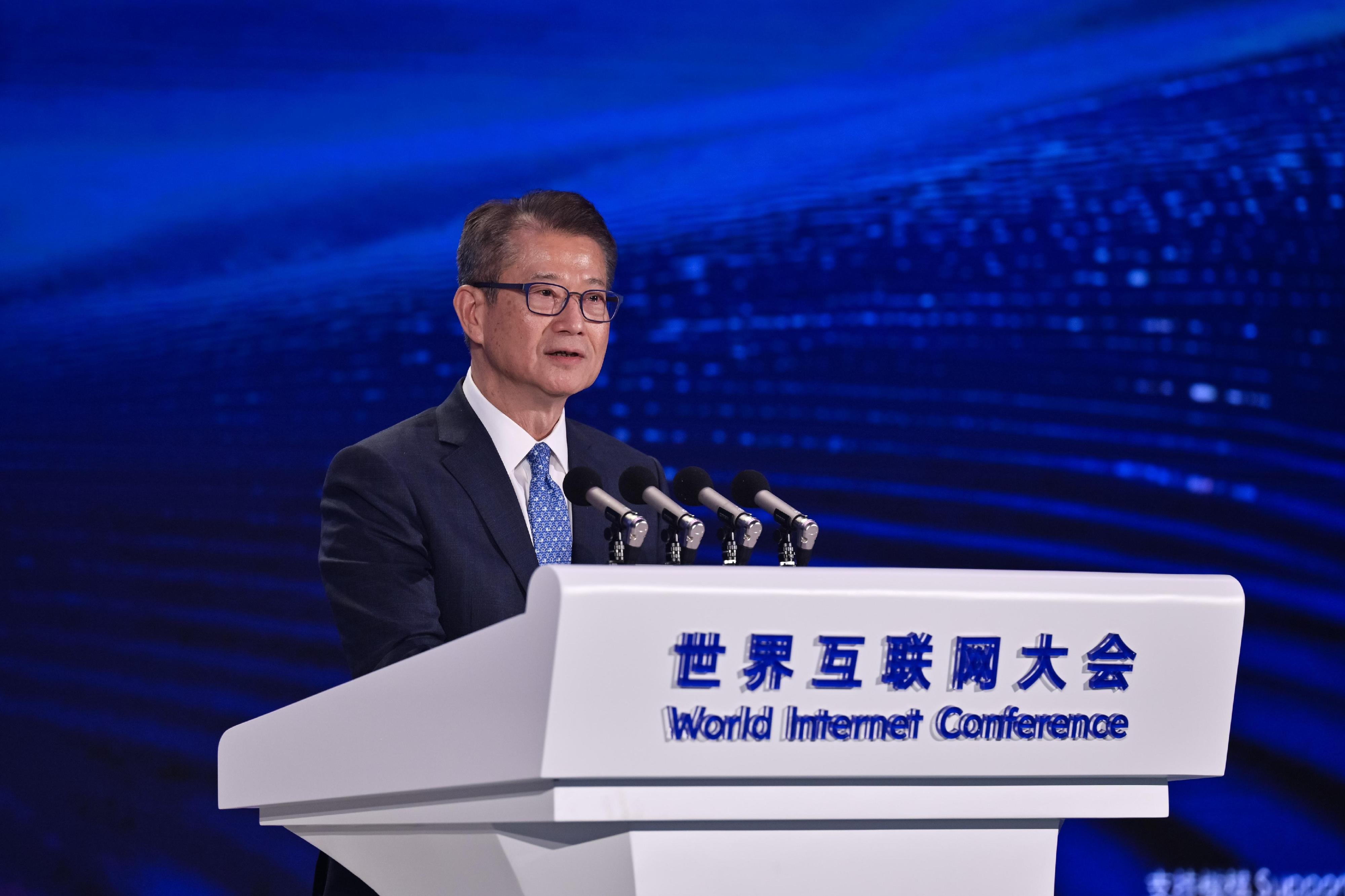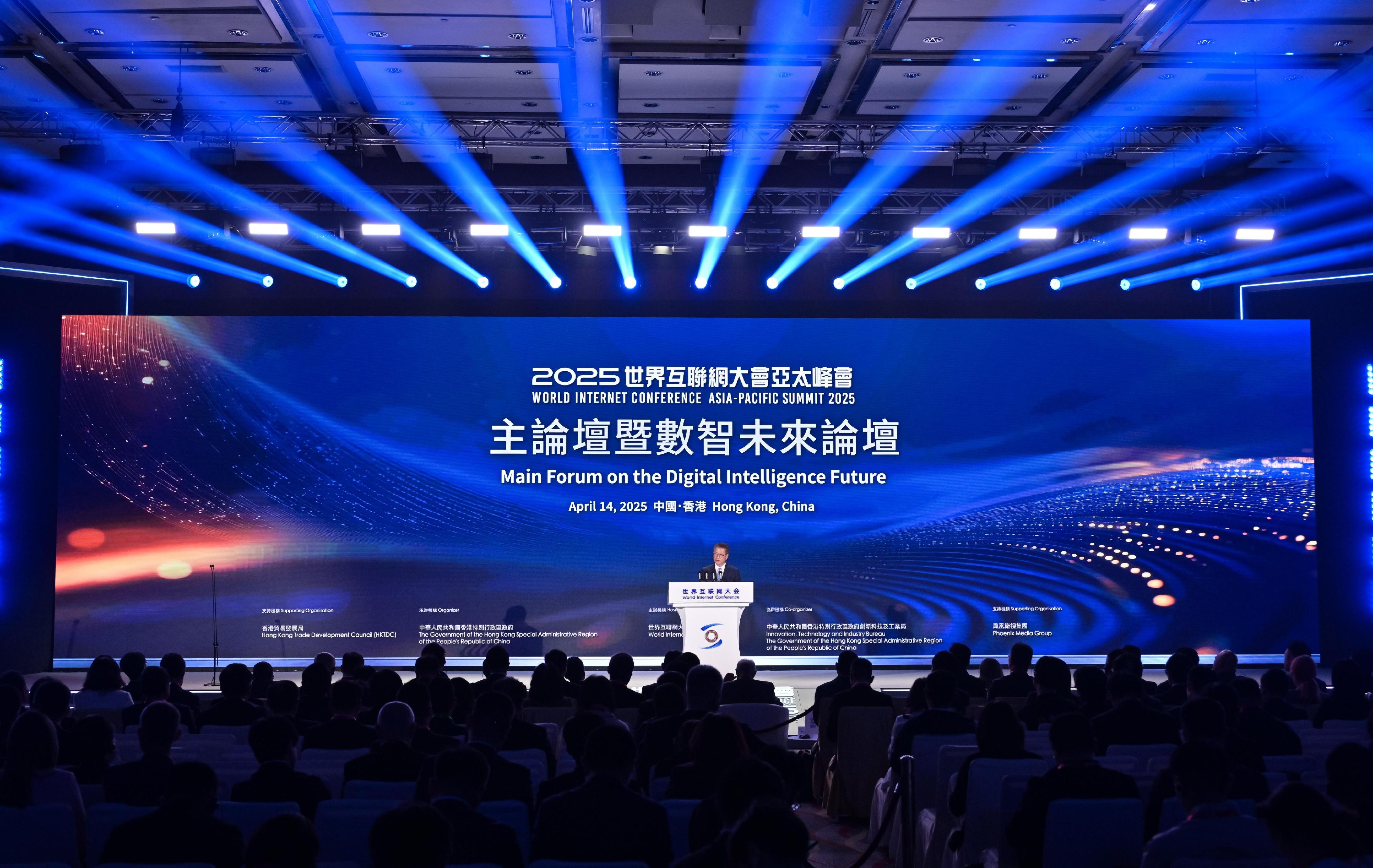Speech by FS at World Internet Conference Asia-Pacific Summit - Main Forum on the Digital Intelligence Future (English only) (with photos/video)
******************************************************************************************
Professor Francis Gurry (Vice-Chairman of the World Internet Conference), 任賢良秘書長 (Secretary General of the World Internet Conference, Mr Ren Xianliang), 祁斌副主任 (Deputy Director of the Liaison Office of the Central People's Government in the Hong Kong Special Administrative Region Mr Qi Bin), 孫蔚敏總工程師 (Chief Engineer of the Cyberspace Administration of China, Ms Sun Weimin), distinguished guests, ladies and gentlemen,
It is a great pleasure to join you all at the Asia-Pacific Summit of the World Internet Conference. The WIC has long served as a vital platform for global dialogue, enabling policymakers, business leaders, scholars and innovators to come together and explore the digital challenges and opportunities of our time, and to find new ways of working together. It is an honour for Hong Kong to host this event for the first time.
The global digital landscape
The Internet stands as the most transformative force of connection of our time. It is also a story of continuous reinvention, from static content in Web 1.0 to social media, e-commerce in Web 2.0, and to the age of Web 3.0 underpinned by blockchain technologies. Coupled with artificial intelligence (AI), this next-generation Internet is once again transforming the way we live and do business. AI-powered tools are enabling governments and businesses to deliver smarter and more responsive services. Decentralised finance and tokenisation, for example, are substantially reducing the cost and improving the efficiency of financial and business transactions.
The digital era today has created significant opportunities for new entrants. Consider the DeepSeek Moment. While global headlines often focus on the AI rivalry between the two great nations, it also reminds us of the innovative prowess and agility of startups, and the multiple pathways to technological progress. It has opened up a future where development will not be decided simply by size or resources, but also by creativity and the courage to pursue visionary ideas.
Despite the enormous progress, equitable digital access remains a global issue. Today, nearly one-third of the world’s population – or some 2.6 billion people – are still offline. For these communities, the absence of digital access means fewer opportunities for education, economic advancement and social inclusion.
Governments and regulators worldwide are also facing mounting challenges such as cybersecurity, data privacy and complexities of cross-border regulatory arbitrage. For example, it is estimated that cybercrime could cost the global economy over US$10 trillion in 2025 alone. This amount, ironically, exceeds the GDP of most nations. Yet, across jurisdictions, governance frameworks are still struggling to keep pace with technological change.
Currently, a more urgent concern is digital fragmentation. The trade war initiated by the United States is likely to extend beyond tariffs. We can foresee more barriers, “larger yards” and “higher walls”, which could stifle innovation and jeopardise global technological progress.
Hong Kong's vision
Ladies and gentlemen, now allow me to turn to Hong Kong. How can we navigate these complex global dynamics to foster a more inclusive and interconnected digital environment? I hope our perspectives and experience can contribute to the current discussions on global digital development.
Our digital strategy is founded on the principles of openness and global connectivity. Under the "one country, two systems" principle, we champion the free flow of data and information – just as we do with goods and capital – as a cornerstone of our competitiveness and status as a free and open economy.
To seize new opportunities brought by the digital economy and address the associated challenges, we need a comprehensive and forward-looking strategy. That’s why, over the past two years, the HKSAR Government has put in place a concrete action plan, covering such areas as digital infrastructure and governance, digital transformation, cross-boundary flow of data and talent development.
A key part of this strategy is to enhance economic inclusiveness through digitalisation. For example, we are supporting SMEs in their digital transformation. At the same time, we have strengthened the sharing of data held by government departments with financial institutions, on a consent basis, to enhance the efficiency of credit assessments.
Another strategic objective is to unlock the full value of data. Hong Kong's unique position as a convergence point for both Mainland and international data gives us a distinct advantage. This will help us not only in developing data-driven industries such as AI and health tech but also a data trading market in Hong Kong.
As we enter the "AI+" era, we will develop AI as a core industry for Hong Kong by the deep integration of AI across industries. Our efforts focus on five key fronts: computing power, algorithms, data, capital and talent. With our international connectivity, we also aim to position Hong Kong as a global hub for AI exchange, promoting dialogues, research collaboration and thought leadership.
A shared future in cyberspace
Ladies and gentlemen, looking forward, we believe there are several key priorities that must be addressed at the global level to ensure the healthy and inclusive development of the Internet.
The first is digital governance. As emerging technologies become more powerful and pervasive, our regulatory frameworks must evolve accordingly, addressing issues such as cybersecurity, data privacy and ethical use of AI. In Hong Kong, we advocate for a balanced, pro-innovation regulatory approach, putting in place appropriate safeguards while encouraging innovation. Our approach to Web 3 and digital assets is a good case in point.
The second is bridging the digital divide. For many developing economies, digital access is a powerful enabler for inclusive growth – improving education, expanding financial inclusion and enhancing public service delivery. I’m glad to report that in Hong Kong, many of our startups have developed innovative and robust solutions in these areas. They are eager to share their technologies with emerging economies.
The third is talent development. In the age of AI, digital literacy is no longer optional – it is essential. This imperative goes beyond formal education and calls for partnerships between the public and private sectors. In Hong Kong, we are working closely with leading tech companies – including Tencent, Alibaba, Lenovo, SenseTime, and startups at Science Park and Cyberport – to deliver technology training and share their entrepreneurial experience with students. Our aim is to cultivate the interest of the next generation and prepare them for a dynamic and innovation-led future.
Concluding remarks
Ladies and gentlemen, the challenges and opportunities of the digital age transcend borders. In this era of rapid technological transformation, what we need is more dialogue, sharing and co-operation so that we can drive the development in Internet, AI and other emerging technologies for the common good of humanity.
On that note, I wish this Summit every success, and I hope each of you will find the discussions ahead insightful, productive and inspiring. Thank you very much.
Ends/Monday, April 14, 2025
Issued at HKT 16:36
Issued at HKT 16:36
NNNN
Photo
Audio / Video
FS attends World Internet Conference Asia-Pacific Summit - Main Forum on the Digital Intelligence Future




